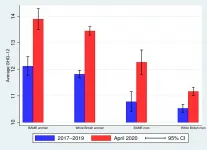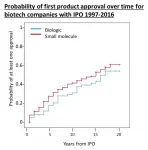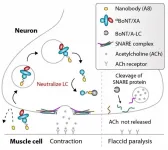(Press-News.org) Our reluctance to think, talk or communicate about death is even more pronounced when we deal with others' loss compared to our own, new research finds, but either way we tend to frame attitudes and emotions in a sad and negative way.
Teaching new more positive ways to address these difficult conversations is the focus of a new paper in PLOS ONE journal by palliative care specialists across Australia.
Led by Flinders University's Research Centre for Palliative Care, Death and Dying (RePaDD) and Palliative and Supportive Services, researchers from Flinders, CQUniversity Australia, NT Palliative Care Central Australia and University of Technology Sydney, surveyed 1,491 people about the use of language to express their feelings and insights into death and dying.
Those surveyed were enrolled in Dying2Learn, a six-week MOOC (massive open online course) course developed at Flinders University to encourage open conversation about death and dying.
Analysis of the emotional content of the words used by the group showed that by the end of the course participants were able to use "more pleasant, calmer and dominating (in-control) words to express their feelings about death", researchers conclude in PLOS ONE.
"In an ageing population, when our elders and terminally ill are often cared for by health professionals in residential care rather than in the home, we can go through life without really discussing or witnessing the end of life," says lead author Dr Lauren Miller-Lewis, Flinders University research associate and CQUniversity positive psychology lecturer.
"Tackling and changing these perspectives will help the community to plan for and manage future needs and expectations of care at end-of-life, improve patient and family care - including greater preparedness for death - and also help develop future health services.
"Words aren't neutral, so understanding the emotional connotations tied to words we use could help guide palliative care conversations," Dr Miller-Lewis says.
Dying2Learn was an innovative online course developed as part of the CareSearch project, with funding from the Australian Government. The course ran four times in 2016, 2017, 2018 and 2020.
A new interactive online resource will be released on the CareSearch website in mid-2021 using insights, feedback and suggestions from the Dying2Learn program to "help all of us be able to start and respond to conversations about death and dying with our family, our neighbours, and work colleagues" (see the webpage here).
Flinders Professor Jennifer Tieman, RePaDD Centre Director and Dying2Learn lead investigator, says the new web content will further assist community to help them feel more comfortable thinking about - and talking about - death and dying as a part of life.
Professor Tieman says further studies using sentiment analysis could provide valuable insights into the way people feel about this issue, and other topics including palliative care, advance care planning, voluntary assisted dying and COVID-19.
Co-author Flinders University Computer Scientist Dr Trent Lewis says automated sentiment or emotional analysis of the words used showed a greater benefit for younger participants of the course who showed a bigger increase in pleasantness (valence) and dominance (power or control) by the end of the course, showing the benefit of gaining insights into becoming more emotionally accepting of death.
"It shows how the general public can gain an acceptance of death as a natural part of life by learning how to openly discuss and address these feelings and attitudes," he says.
The study also found differences between how course participants described the feelings towards death and dying of other people in the community compared to their own - with 'sad', 'fear', 'scary' and 'loss' more common than their own preference for less emotionally negative words such as 'inevitable', 'peace' and 'natural'.
"The assumption was that others feel more negatively about death then they do themselves," Dr Lewis says.
"This could impact on our willingness to start conversations about death with others," adds Dr Miller-Lewis. "Do we avoid it because we think others will get upset if we bring it up, and does this then leave important things unsaid?" she asks.
INFORMATION:
The new paper, 'Words describing feelings about death: A comparison of sentiment for self and others and changes over time' (2021) by LR Miller-Lewis, TW Lewis, J Tieman, D Rawlings, D Parker and CR Sanderson has been published in PLOS ONE DOI: tba
Acknowledgement: This work is part of the CareSearch project, which received grant funding from the Australian Government Department of Health.
Photosynthetic organisms tap light for fuel, but sometimes there's too much of a good thing.
New research from Washington University in St. Louis reveals the core structure of the light-harvesting antenna of cyanobacteria or blue-green algae -- including key features that both collect energy and block excess light absorption. The study, published Jan. 6 in Science Advances, yields insights relevant to future energy applications.
Scientists built a model of the large protein complex called phycobilisome that collects and transmits light energy. Phycobilisomes allow cyanobacteria to take advantage of different wavelengths of light than other photosynthetic ...
An analysis of 145 scholarly journals found that, among various factors that could contribute to gender bias and lesser representation of women in science, the peer review process itself is unlikely to be the primary cause of publishing inequalities. However, Flaminio Squazzoni and colleagues emphasize that the study does not account for many other factors that may affect women's representation in academia, including educational stereotypes and academic choices of priorities and specialties. Even as female representation has improved in fields such as the humanities, psychology, and the social sciences, a publication gap persists, with male authors continuing to publish more manuscripts in more prestigious journals. To better understand whether ...
Step into your new, microscopic time machine. Scientists at the University of Colorado Boulder have discovered that a type of single-celled organism living in modern-day oceans may have a lot in common with life forms that existed billions of years ago--and that fundamentally transformed the planet.
The new research, which will appear Jan. 6 in the journal Science Advances, is the latest to probe the lives of what may be nature's hardest working microbes: cyanobacteria.
These single-celled, photosynthetic organisms, also known as "blue-green algae," can be found in almost any large body of water today. But more than 2 billion years ago, they took on an extra important role in the history of life on ...
In the UK, men from ethnic minorities and women may have experienced worse mental health declines than White British men, according to a study published January 6, 2021 in the open access journal PLOS ONE by Eugenio Proto and Climent Quintana-Domeque of institutions including the University of Glasgow and the University of Exeter, UK.
The COVID-19 pandemic, and the measures enacted to restrict the spread of the virus, have had a major impact on the lives of citizens globally. The authors of the present study examined changes in mental health associated with the pandemic across ethnic groups in the UK.
The researchers used data from the UK Household Longitudinal Study, comparing responses from participants between 2017 and 2019 (i.e.: prior to the pandemic) to responses from ...
CAR T cells are a breakthrough class of effective but often toxic cancer therapies
To prevent overactivation, switchable CAR T cells were engineered that can be turned on and off with an approved, widely used cancer drug
BOSTON - Scientists at Dana-Farber Cancer Institute and Mass General Cancer Center have created molecular ON-OFF switches to regulate the activity of CAR T cells, a potent form of cell-based immunotherapy that has had dramatic success in treating some advanced cancers, but which pose a significant risk of toxic side effects.
CAR T cells are immune cells genetically modified to recognize and attack tumors ...
The distribution and concentration of dissolved oxygen and water temperature in the oceans and freshwaters are usually far more influential in shaping the growth and reproduction of fish than the distribution of their prey.
In a new paper in Science Advances, Daniel Pauly, principal investigator of the Sea Around Us initiative at UBC's Institute for the Oceans and Fisheries, argues that scientists need to avoid attaching human attributes to fish and start looking at their unique biology and constraints through a different lens.
This lens is Pauly's own Gill Oxygen Limitation Theory (GOLT), ...
New York City, January 6, 2021 - CytoDel, Inc. ("CytoDel" or "the Company"), a privately-held corporation, today announces the publication of preclinical data on the Company's lead product, Cyto-111, in the peer-reviewed journal, Science Translational Medicine. The complete text of the article titled, "Neuronal Delivery of Antibodies has Therapeutic Effects in Animal Models of Botulism," can be found here.
Cyto-111 was conceived, expressed and purified in the laboratory of Konstantin Ichtchenko, Ph.D., NYU Grossman School of Medicine, Department of Biochemistry and Molecular Pharmacology, who was a principal investigator in the study, which ...
A large scale study from Bentley University of the biotechnology companies that completed Initial Public Offerings from 1997-2016 estimates that 78% of these companies are associated with products that reach phase 3 trials and 52% are associated with new product approvals. The article, titled "Late-stage product development and approvals by biotechnology companies after IPO, 1997-2016," shows that these emerging, public biotechnology companies continue to have a role in initiating new product development, but are no longer distinctively focused on novel, biological products.
The new report from the Center for Integration of Science and Industry at Bentley University, published in Clinical Therapeutics, studied the 319 biotechnology ...
E. coli food poisoning is one of the worst food poisonings, causing bloody diarrhea and kidney damage. But all the carnage might be just an unintended side effect, researchers from UConn Health report in the 27 November issue of Science Immunology. Their findings might lead to more effective treatments for this potentially deadly disease.
Escherichia coli are a diverse group of bacteria that often live in animal guts. Many types of E. coli never make us sick; other varieties can cause traveler's diarrhea. But swallowing even a few cells of the type of E. coli that makes Shiga toxin can make us very, very ill. Shiga toxin damages blood vessels in the intestines, causing bloody diarrhea. If ...
Taking advantage of the chemical properties of botulism toxins, two teams of researchers have fashioned non-toxic versions of these compounds that can deliver therapeutic antibodies to treat botulism, a potentially fatal disease with few approved treatments. The research, which was conducted in mice, guinea pigs, and nonhuman primates, suggests that the toxin derivatives could one day offer a platform to quickly treat established cases of botulism and target hard-to-reach molecules within neurons. Botulism manifests due to bacterial toxins called botulinum neurotoxins (BoNTs), which are the most potent toxins known ...



